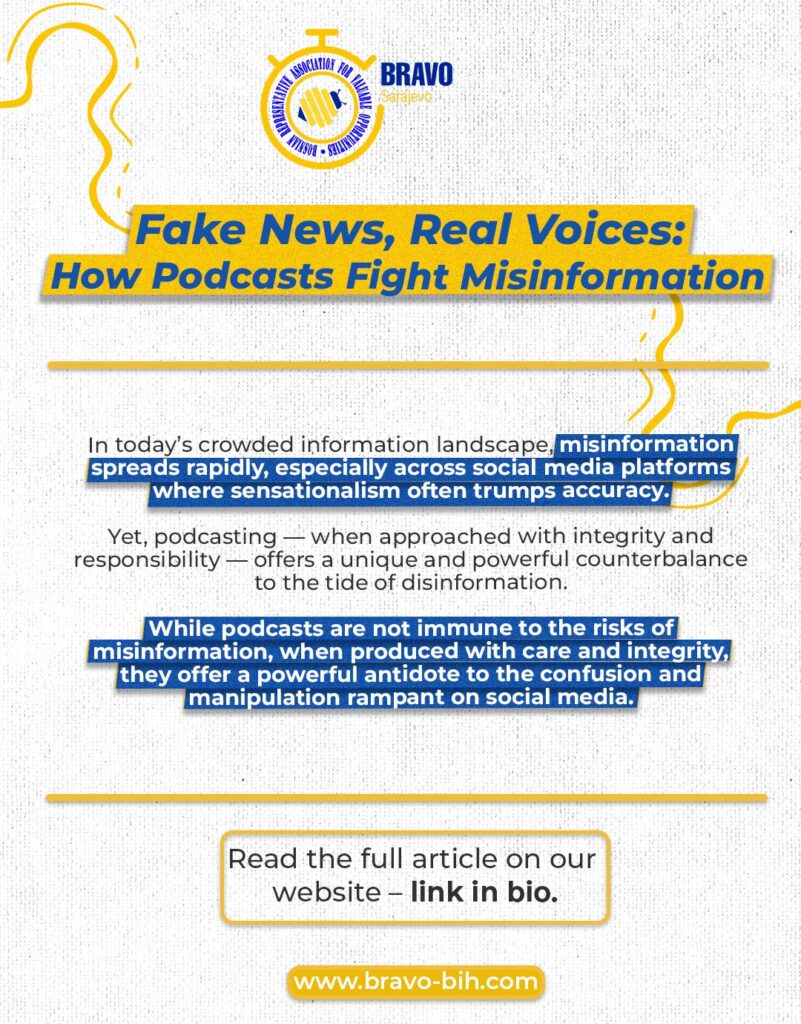
In today’s crowded information landscape, misinformation spreads rapidly, especially across social media platforms where sensationalism often trumps accuracy.
This flood of false or misleading information poses serious challenges to democracy and informed citizenship, particularly among young audiences who increasingly rely on digital channels for their news. Yet, podcasting — when approached with integrity and responsibility — offers a unique and powerful counterbalance to the tide of disinformation.
To understand podcasting’s potential, it helps to compare it with mainstream media and social media:
- Traditional mainstream media outlets are generally governed by editorial standards, fact-checking protocols, and regulatory oversight, which promote accountability and accuracy. However, these same structures can sometimes limit the diversity of voices and perspectives, leading to perceptions of bias.
- Social media platforms, on the other hand, have become the primary news source for many young people, but their algorithm-driven feeds often amplify sensational, unverified, or outright false claims. The chaotic nature of social media, combined with inconsistent fact-checking, creates an environment ripe for manipulation and misinformation.
Podcasts stand apart in this landscape because of their depth, tone, and flexibility. Unlike the rapid-fire, emotionally charged nature of social media posts, podcasts allow for long-form conversations, thorough reporting, and nuanced exploration of complex issues. Listeners engage with content at their own pace, which fosters reflection and critical thinking rather than impulsive reactions.
How Podcasters Build Trust and Credibility
Building trust and credibility is essential for podcasters who want to combat disinformation effectively. Transparency is key: responsible podcasters clearly distinguish between facts and opinions, cite their sources, and openly acknowledge uncertainties or mistakes.
Consistency in publishing and a clear editorial stance help build a loyal audience that knows what to expect. Featuring expert voices, such as journalists, academics, or people with lived experience, adds authority and authenticity to the content. Ethical standards, including avoiding sensationalism and correcting errors promptly, further reinforce trust and help counteract misinformation.
Podcast Formats That Make News and Policy Accessible
Several podcast formats have proven especially effective at making news and policy accessible to younger listeners. Explainer podcasts break down complex current events in plain language, making them understandable regardless of prior knowledge. Panel discussions that feature multiple guests encourage debate and present diverse viewpoints, helping listeners grasp the nuances of controversial topics. Narrative storytelling podcasts blend personal stories with factual reporting, making social and political issues relatable and memorable. Additionally, some podcasts have begun incorporating fact-checking segments or real-time alerts within episodes to flag misleading claims and guide listeners toward credible sources.
Critical Listening Skills for Podcast Consumers
For podcast consumers, developing critical listening skills is essential to navigate the vast and varied audio landscape responsibly. Critical listening means actively engaging with the content rather than passively absorbing it. It involves questioning who is behind the podcast, their qualifications, and any potential biases they might have. Listeners should pay close attention to whether claims are supported by credible evidence and whether hosts clearly distinguish between verified facts and personal opinions.
Another important skill is recognizing the difference between fact and interpretation. Podcasts often blend storytelling with analysis, so it’s crucial to be aware when a host is sharing an opinion or perspective rather than stating an objective fact. Being alert to this distinction helps avoid accepting subjective views as absolute truth. Additionally, listeners should be cautious of oversimplified or absolute language, which can sometimes signal bias or a lack of nuance.
Finally, emerging practices like auditory cues or fact-checking segments within podcasts can help listeners identify and question potentially misleading information. By approaching podcasts with curiosity and a healthy dose of scepticism, consumers — especially young audiences — can become more discerning, making podcasts a valuable tool for informed and critical engagement with the world.
Conclusion
While podcasts are not immune to the risks of misinformation, when produced with care and integrity, they offer a powerful antidote to the confusion and manipulation rampant on social media. By fostering transparency, depth, and critical thinking, podcasters can become frontline defenders of democracy, equipping young audiences with the tools they need to discern truth from falsehood in the digital age.
